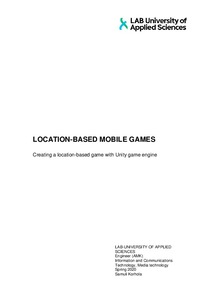Visual clarity of game world maps
Tanina, Liubov Jr (2024)
Tanina, Liubov Jr
2024
All rights reserved. This publication is copyrighted. You may download, display and print it for Your own personal use. Commercial use is prohibited.
Julkaisun pysyvä osoite on
https://urn.fi/URN:NBN:fi:amk-2024052314728
https://urn.fi/URN:NBN:fi:amk-2024052314728
Tiivistelmä
The background of the study was based on the challenge of the game project needs. A key aspect of the development process involved the design of the game world map, with the primary challenge being to incorporate all intended level areas and functionalities in a manner that ensures visual clarity and avoids confusing players.
The thesis aimed to achieve several objectives: first, to explore the design principles pertinent to the creation of game maps; second, to assess the methodologies employed in designing game maps across different projects; and finally, to develop a design for the game world map within the framework of the "Scout Out" project.
In conducting these studies, qualitative research methods, such as content analysis, case studies, and visual methods, were used. These methodologies served as valuable tools for gathering and analysing existing information and content related to game world maps and their creation. Furthermore, practice-based study methods were utilised to apply the acquired knowledge to the design of the game world map for the "Scout Out" project.
The study showed the importance of consideration of players’ behavior and its influence on the map design. Additionally, the research reflects the application of Gestalt principles in game map’s elements. During the study, the game review was conducted to show the implementation of explored techniques. The commissioner received an improved prototype of a game world map that will participate in future testing. In addition, the commissioner received extensive and valuable insights from the game world map research.
The thesis aimed to achieve several objectives: first, to explore the design principles pertinent to the creation of game maps; second, to assess the methodologies employed in designing game maps across different projects; and finally, to develop a design for the game world map within the framework of the "Scout Out" project.
In conducting these studies, qualitative research methods, such as content analysis, case studies, and visual methods, were used. These methodologies served as valuable tools for gathering and analysing existing information and content related to game world maps and their creation. Furthermore, practice-based study methods were utilised to apply the acquired knowledge to the design of the game world map for the "Scout Out" project.
The study showed the importance of consideration of players’ behavior and its influence on the map design. Additionally, the research reflects the application of Gestalt principles in game map’s elements. During the study, the game review was conducted to show the implementation of explored techniques. The commissioner received an improved prototype of a game world map that will participate in future testing. In addition, the commissioner received extensive and valuable insights from the game world map research.
Kokoelmat
Samankaltainen aineisto
Näytetään aineisto, joilla on samankaltaisia nimekkeitä, tekijöitä tai asiasanoja.
-
Game Development in Unity : Game Production, Game Mechanics and the Effects of Gaming
Dansie, Jason (Metropolia Ammattikorkeakoulu, 2013)The goal of this thesis is to examine how video games are designed and to see how differ-ent game mechanics work and how to use them in the development of a game, as well as examine what are both the positive and negative ... -
Location-based mobile games : creating a location-based game with the Unity game engine
Korhola, Samuli (2020)The subject of this thesis is location-based mobile games. Location-based mobile games are a way for mobile games to combine reality with virtual worlds and thus re-define the gaming experience. This thesis presents ... -
”WE WANT A 3D GAME” : Customer expectations for the games company when buying a serious game
Sorppanen, Mikko (Oulun seudun ammattikorkeakoulu, 2012)All digital games are not used for entertainment. Some of them can also be used for non-entertainment purposes and these games are called serious games. This thesis is carried out in co-operation with one Finnish games ...



